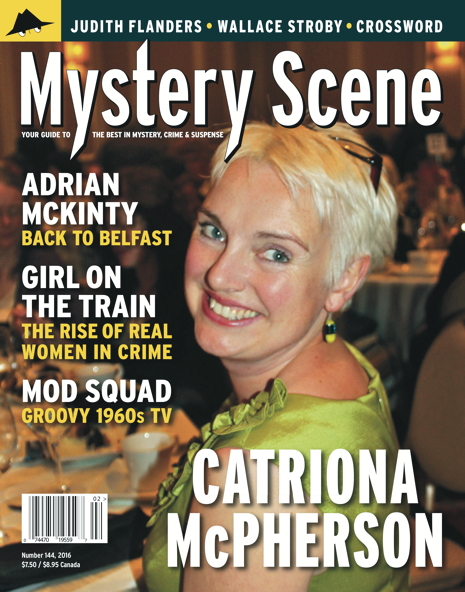Tidal waves in popular culture invariably leave their mark on crime and mystery fiction. Catriona McPherson notes that it was the wildly popular TV series Downton Abbey that persuaded a US publisher to take on her 1920s-era Dandy Gilver novels. The rest is history—literally, since the novels take on many social issues and events in England of the 1920s and ’30s. Oline Cogdill chats with the author in this issue.
The youth revolution of the 1960s was the inspiration for TV’s The Mod Squad (1968-1973) with its trio of hippies-turned-undercover cops. Rita Lakin was on the set as a scriptwriter—one of the very few women writers at the time—and she has some interesting tales to tell in this issue. The Mod Squad was one of my earliest exposures to the mystery genre as a kid. I still remember the banner day I got my Mod Squad lunch box. It was far out!
A dark time in recent history left its mark on Adrian McKinty’s writing. His series featuring Sean Duffy, a Belfast cop during The Troubles (1969-1997), is partly based on his own childhood memories of that tumultuous period in Irish history. Technically, the Sean Duffy books are historical mysteries, but, as McKinty notes, “Drive around Belfast and look at the murals saying ‘Remember 1916’ or ‘Remember 1690’ and you’ll appreciate that the past is very much alive” in Ireland.
The business of book publishing itself was the inspiration for Judith Flanders’ witty novels. Flanders was once a book editor and has bestowed her expertise and experience on her series character, Samantha “Sam” Clair. Before my life in crime magazines began, I was a book editor in New York. Sam’s acidic observations on interminable editorial meetings, recalcitrant authors, and woefully inept editorial assistants, had me laughing out loud. Cheryl Solimini chats with Flanders in this issue.
Megan Abbott’s interesting essay, “Girls Like Us,” has this to say on the rise of ordinary women in current crime fiction such as The Girl on the Train and Gone Girl: [I]t’s strange to call these books “escapist.” Their settings, so close to home, are places most readers find more familiar than the world of the mob, or spycraft, or the high-stakes drug trade. The domestic sphere is a world where knowledge is always only partial, where power in any relationship is fleeting, and where marriage—at least most of them—is always a bit of a masquerade. And this is a world that readers understand intimately and struggle with daily.
Other authors also have their say in this issue as they discuss their current books. Reece Hirsch, an attorney specializing in privacy and cybersecurity, finds technology hot on the heels of his imagined plots. Jon McGoran recounts a service trip to Haiti that involved him in a farmers’ political uprising. Reporter Andrew Welsh-Huggins puts his years covering Ohio’s state government to good use in a political thriller, and Tara Laskowski considers how people are affected by the misfortunes of others in her short story collection.
Kate Stine
Editor-in-chief



